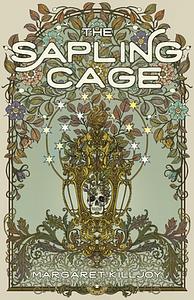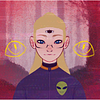You need to sign in or sign up before continuing.
Take a photo of a barcode or cover
adventurous
dark
mysterious
medium-paced
Plot or Character Driven:
Plot
Strong character development:
Yes
Loveable characters:
Yes
Diverse cast of characters:
Yes
Flaws of characters a main focus:
No
adventurous
emotional
funny
hopeful
inspiring
medium-paced
Plot or Character Driven:
Plot
Strong character development:
Yes
Loveable characters:
Complicated
Diverse cast of characters:
Yes
Flaws of characters a main focus:
No
adventurous
emotional
hopeful
inspiring
reflective
relaxing
medium-paced
Plot or Character Driven:
A mix
Strong character development:
Yes
Loveable characters:
Yes
Diverse cast of characters:
Yes
Flaws of characters a main focus:
No
this book has anarchist and trans positive themes woven in, and the loving and curious nature of the main character makes it a joy to read!!
The Sapling Cage features Lorel, a trans teenager, who performs a switcheroo with her best friend, a noble blooded daughter of a witch fated to be the same. Lorel tells some white lies and becomes a witch in training, a whelp. the world building and magic systems revealed in the training scenes are fun, and also those scenes really do move the plot and characters on as well. whelps are constantly reminded that they have free will and actually are not required to be there, the witches make decisions communally, and wander the land helping villagers. it's very cute.
one note is that the pacing felt off, the last culminating part of the story felt very quick, and i wish we spent a bit more time with some of the characters to get to know them. there were lots of moments where interesting philosophical questions about power, trans identity, government, relationships, were brought up, and the story also has a strong ecological message. and they were all answered through an anarchist and queer positive lens... i think this is an ambitious book that could have honestly benefited from being longer.
the book also felt a bit introspective, which makes sense for the character and is addressed in-text honestly multiple times ... but yes I would have liked to have other characters stories fleshed out a bit more. it does read as self aware of that point tho, and I'm interested to see where the next two books go as Lorel grows as a young adult.
I also appreciated that the trans narrative feels very written by a trans person (bc it is), and that the characters around Lorel demonstrate genuine support in frankly teaching-moment ways.
also i love how Lorel as a MC constantly asks questions!!
The Sapling Cage features Lorel, a trans teenager, who performs a switcheroo with her best friend, a noble blooded daughter of a witch fated to be the same. Lorel tells some white lies and becomes a witch in training, a whelp. the world building and magic systems revealed in the training scenes are fun, and also those scenes really do move the plot and characters on as well. whelps are constantly reminded that they have free will and actually are not required to be there, the witches make decisions communally, and wander the land helping villagers. it's very cute.
one note is that the pacing felt off, the last culminating part of the story felt very quick, and i wish we spent a bit more time with some of the characters to get to know them. there were lots of moments where interesting philosophical questions about power, trans identity, government, relationships, were brought up, and the story also has a strong ecological message. and they were all answered through an anarchist and queer positive lens... i think this is an ambitious book that could have honestly benefited from being longer.
the book also felt a bit introspective, which makes sense for the character and is addressed in-text honestly multiple times ... but yes I would have liked to have other characters stories fleshed out a bit more. it does read as self aware of that point tho, and I'm interested to see where the next two books go as Lorel grows as a young adult.
I also appreciated that the trans narrative feels very written by a trans person (bc it is), and that the characters around Lorel demonstrate genuine support in frankly teaching-moment ways.
also i love how Lorel as a MC constantly asks questions!!
Graphic: Bullying
Moderate: Transphobia
adventurous
medium-paced
Plot or Character Driven:
A mix
Strong character development:
Complicated
Loveable characters:
Complicated
Diverse cast of characters:
Yes
Flaws of characters a main focus:
Yes
DNF @68% (audiobook)
Oof. Today I threw in the towel on Margaret Killjoy's The Sapling Cage because I'd rather be alone with my thoughts than sit through another three hours of this book. This is a fantasy book about a "boy," Lorel, who disguises herself as her female friend to join a witches' coven (She's a transgirl, but her journey on that understanding is part of the book, and she refers to herself as a boy for much of the story.)
First, I will say that I think Lorel is a protagonist written with love; clearly Killjoy wanted her to be relatable and sympathetic, and someone eager for a trans fantasy protag may be willing to forgive the book's many weaknesses for that. That said...
I was shocked to realize this book is not categorized as Young Adult/Youth literature. Lorel is 16 at the start of the book and she's very sixteen. She makes all the sorts of stupid, immature mistakes you would expect from a teenager, which makes her a realistic character, but also deeply frustrating to read as an adult, particularly since the first-person narration puts us right in her head. The book feels young even for a sixteen-year-old; it reads more like a preteen novel about teenagers.
The book itself feels incredibly juvenile, both in prose and in narrative. The writing is simplistic, the narrative barely there, and the worldbuilding painfully thin. The book infodumps on the reader constantly, going into detail about things that are then never relevant again and don't connect into any kind of overarching picture of what this world is like. Reads very much like the author just throwing a bunch of things she thought were cool at the reader without actually thinking about how they would impact her world or the characters in them.
The opening chapters were a warning, because it was exactly the kind of rushing through the necessary set-up to get to the plot the author's actually interested in that I might have written when I was sixteen. Lorel comes up with this (allegedly very dangerous) plan to take her friend's place, convinces both her friend and her mom this is okay, and gets the boot out the door at lightning speed. Where the author might have taken time to thoughtfully build up the world Lorel lives in and what she's seeking or giving up by seeking witchhood, she clearly can't wait to get to the witches, and so skips over the rest of that stuff.
It's not even clear why witches exist or what they do besides run around and get chased out of places. At 68%, the entire story has been has been the witches walking from one place to another, being unwelcome, and having some random little dangerous encounter which is resolved in a page or two. Not only do they have no plan for dealing with the individuals or organization causing the blight at the center of the plot, they also seem to have no plan for improving their PR or for dealing with the "whelps" (pre-apprentice stage witches, where Lorel starts out) or any organization to their group at all. They seem to just wander around the world following magical sources with no goals, plans, or purposes. There's barely even a dim philosophy holding them together. All of this makes it a little baffling why any parent is promising their kid to the witches, which is the case for most of the whelps.
There are also other groups: "knights" of various branches who stand in near-universal opposition to witches, and "brigands" who seem to be highwaymen. Killjoy must have wanted to establish some balancing dynamic between them, but it just comes off like sorting characters into factions (This character wants to be a Knight, this character wants to be a Witch, etc.) as shorthand for having to get into that character's personality or worldview. Although the knights are frequently presented as enemies of the witches, we learn basically nothing about them (except that Lorel's best friend has joined them, which seems like it should cause some conflict between them, but it doesn't), and the brigands are treated as some group akin to knights or witches, rather than a synonym for "criminal," which is a pretty broad term.
The teenage whelps do a lot of dumb things, but the witches also consistently fail to adequately prepare them for the various dangers they encounter. I realize they're supposed to be tough mentor types, and that tracks with the dangerous lives witches lead here, but they come off remarkably irresponsible to their charges. They also seem to prioritize physical combat above anything else they could be teaching the whelps, for reasons they never explain, and the whelps seem as often a burden to the witches as the next generation of witches themselves.
The inter-character relationships are very predictable, you can see the whole outline of them from the very beginning, and nothing happened that was surprising. The characters themselves are flat and shallow and there's very little variation between them, and certainly not in their speaking style. I could not identify anything about the fellow whelps, except Didey who is the mean one and Araneigh (she will always be RNA to this audiobook listener) who is the one Lorel has a crush on.
The majority of conflicts set up are solved almost immediately, with the exception of the main plot about the blight and the issue of Lorel's gender identity, which makes it grow tiring to encounter some new problem which you know will be over shortly. These are often the opportunity for Killjoy to introduce some fantastical creature which will never matter again outside of this one scene and whose existence does not figure into any cohesive worldbuilding. (And for a very minor, worldbuilding-related nitpick, how does Lorel know what "adrenaline" is? The technology of this world is at a medieval level at most.)
I also hated the audiobook narration. I've never disliked one so much before that it was distracting me from the story, but here we are. The narrator uses a phenomenally grating flat and nasally voice for many of the characters, and is prone to trailing off into a near-whisper, which makes managing the volume a pain. She also mumbles: I couldn't tell if Lorel's fellow whelp was "Hex," "Pex," "Ex" or something else for several chapters, and it wasn't until over 60% through the book I realized the name of Lorel's hometown was "Leadston" not "Ludston." Thought she was just mispronouncing "dame" the entire time until reviews revealed the witches' titles are actually "Dam So-and-so."
It has some nice messaging about growing into yourself and accepting your differences and learning to get along with others, but so do a lot of other books that are better-written.
This was a very disappointing book, and I will be avoiding anything else from this author going forward. Possibly when I was a teenager I would have found it entertaining, but I'm not sure even then. It just feels so very hollow.
adventurous
emotional
funny
hopeful
inspiring
tense
slow-paced
Plot or Character Driven:
A mix
Strong character development:
Yes
Loveable characters:
Yes
Diverse cast of characters:
Yes
Flaws of characters a main focus:
No
Witchy YA novel. Characters were a little too young to be believable but story was good. One pepper.
It was an enjoyable story, I just ran out of steam with it. My library loan ended and even when I got it back, I wasn't motivated to finish it.
adventurous
inspiring
medium-paced
Plot or Character Driven:
A mix
Strong character development:
Yes
Loveable characters:
Yes
Diverse cast of characters:
Complicated
Flaws of characters a main focus:
Complicated
adventurous
hopeful
mysterious
medium-paced
Plot or Character Driven:
A mix
I enjoyed this book. The main character struggles with gender identity in a fantasy story. It's really beautiful in a lot of ways, but a bit heavy-handed with incorporating the issues within the story to make very obvious parallels to today. The story is good, and writing was okay. Definitely feels more YA.





